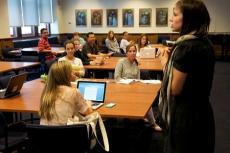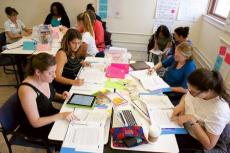Courses
Students may enroll in the program full-time or part-time. The basic curriculum for M.A. students includes:
Core: Required of all students (23 points)
-
C&T 4138 Teaching literacy in the early years (2-3)
Marjorie Siegel, Bessie Dernikos, Ellen Ellis
This course examines theory, research, and practice of literacy learning and teaching in the early years. The course emphasizes early literacy development, assessment-based literacy instruction, the sources of support and difficulty provided by books and other texts, methods of teaching early literacy (including reading conferences, read alouds, guided reading, shared reading, interactive writing, phonics, and critical literacies), and approaches to assessing and teaching decoding, spelling, fluency, text use, and comprehension. -
C&T 4139 Constructing critical readers (2-3)
Lucy Calkins, Mia Hood
Pre-requisite: C&T 4151, C&T 4858, or C&T 5800
This course examines theory, research, and practice on teaching reading comprehension in intermediate classrooms. Students will study curriculum design, assessment practices, and teaching methods and materials. The course emphasizes curricular structures and strategies for teaching comprehension, grades 2-8. -
C&T 4151 Teaching of writing (2-3)
Ellen Ellis, Mia Hood
This course integrates theory and practice for teachers. Topics include writing development, reading-writing connections, and classroom methods for teaching the writing process in elementary classrooms. or -
C&T 5520 Advanced Teaching of Writing (2-3)
Lucy Calkins
Pre-requisite: C&T 4151 or C&T 5800
This is an advanced course for teachers who want to become especially proficient at teaching writing. The emphasis in this course will be on developing your methods of teaching writing so that you are skilled at conferring, assessing, teaching minilessons, making reading writing connections, and designing curriculum. -
C&T 4200 Fieldwork in curriculum and teaching (3, two semesters required)
Lucy Calkins, Mia Hood, Rebecca Bellingham, Ellen Ellis
Fieldwork is the course in which students approach reflective practices. This course must be taken in conjunction with a deep involvement in schools. Full-time students are placed with master literacy educators and engage in consistent work in a school setting. Fieldwork sections are differentiated depending on the level of teaching experience as well as the semester. Students develop their skills by learning the array of methods that literacy teachers use, addressing particular classroom challenges, and researching classroom students and their practices. Coursework also positions the student as a literacy leader, addressing staff development and literacy coaching. Students focus on developing an inquiry stance within their own classrooms and schools as teacher-researchers. -
HBSK 4072 Theory and techniques of reading assessment and intervention (3)
Overview of theories, assessment, and intervention techniques for reading and writing across the lifespan. Both typical development and literacy difficulty are addressed. Materials fee: $50. -
C&T 4140 Literature for younger children (2-3)
Jodene Morrell, Ellen Ellis, Elizabeth Morphis, Maria Paula Ghiso
This course helps teachers develop a deep knowledge of PK-grade 2 literature. Course participants will come to understand the sources of difficulty and support that particular books provide learners, and ways in which informed instructors can use books as co-teachers. Participants will study how particular texts can provide special supports for certain reading behavior. They will study texts that teachers might use for reading aloud, shared reading, thematic studies, and independent reading. Participants will learn about various genres of literature for young children with emphasis upon criteria for selecting and interpreting quality material. This course will also engage students in exploring critical literacy. -
C&T 4141 Literature for older children (2-3)
Maria Paula Ghiso
This course aims to help participants come to know the series books, mysteries, historical fiction, fantasy, and realistic fiction that commonly fill the shelves of 2nd-5th grade classrooms. Students will consider children’s developmental issues, theories of reading, and emphasis on literary qualities—such as genre, author’s style, theme, and character—to create meaningful, literature-based curricula. Additionally, while exploring this literature, students will consciously develop their own reading skills, including inference, interpretation, critical reading, and envisionment, learning from the inside about the skills of powerful reading. - C&T 5037 Literacy, culture and the teaching of reading (2-3)
Bessie Dernikos, Maria Paula Ghiso, Jodene Morrell
This course examines current practices of reading instruction in light of theory and research on literacy as a social, cultural and political practice. The emphasis is on intersections of class, race/ethnicity, gender, and sexuality as critical axes for understanding culturally-specific language and literacy practices, and as a basis for re-imagining reading instruction rooted in the experiences of students.
Master’s Action Research Project: Required of all students (1 point)
- C&T 4502 Master’s project (1)
Mia Hood, Jodene Morrell, Kelly Johnston, Bessie Dernikos, Amy Tondreau
This course supports students in developing proposals to initiate the required Master’s action research project. The course is structured to encourage guided inquiry and reflection on a topic that emerges from one of the core courses of study, with an emphasis on the cyclical process of observations, reflection, and instruction. Participants will engage in professional readings and related studying which informs work in classrooms and then leads to new questions and to more research, including more reading and related study. Inquiry will be based on students’ fieldwork and their own teaching experiences. The course will meet over the course of the fall semester, then students will embark on their independent projects during the spring semester.
Completion of Master’s Action Research Project
Within-Department Selectives: Required of all students (4 points)
Students must select at least two courses from the following list:
-
C&T 4858 Institute: Teaching of reading (3)
Lucy Calkins and Staff of the Teachers College Reading and Writing Project
Over a thousand educators from across the world travel to Teachers College every summer to participate in this institute, designed to lift the level of reading instruction across whole schools. Each day begins with a keynote address by a leader in the field; recent speakers include Kylene Beers, Dick Allington, Harvey Daniels and Ellin Keene. Then there are sections that are differentiated by grade level and prior experience at the institute, with advanced sections on topics as diverse as Supporting English Language Learners, Teaching Nonfiction Comprehension Strategies, etc. -
C&T 5800 Institute: Teaching of writing (1, 3, or 6)
Lucy Calkins and Staff of the Teachers College Reading and Writing Project.
A thousand teachers from across the world convene each summer at Teachers College to attend the Teachers College Reading and Writing Project’s Institute on the teaching of writing. The institute helps teachers lead effective writing workshops, teaching K-8 students to draft, revise, and edit their own writing. Each day begins with a keynote address. Recent speakers include Carl Anderson, Patricia MacLachlan, Billy Collins, Georgia Heard, and Eloise Greenfield. Literacy Specialist students generally attend advanced sections. -
C&T 4137 Literacy and learning in the content areas (2-3) or
Marjorie Siegel, Carmela Gustafson
Introduction to theory, research, and practice on the role of literacy in learning mathematics, social studies, science, and the arts. Examination of talk, texts, and reading/writing practices used in content area teaching. - C&T 4842 Institute: Content Area Literacies (3)
Marjorie Siegel, Carmela Gustafson
This course will introduce students to a toolkit of theories and practices to aid them in rethinking and redesigning literacy practices used in teaching mathematics, science, social studies, and other content areas.
Out of Program Selectives: Required of all students (4-6 points)
To satisfy the college breadth requirement, students must complete two Teachers College courses in addition to HBSK 4072, which is part of the core. (A course for this purpose is defined as one in which a minimum of 2 points is earned outside the program.)
- A&HE 4052 Adolescents and literature (3)
- A&HL 4001 Sociolinguistics and education (3)
- A&HT 4077 TESOL classroom practices (3)
- ITSF 4013 Literacy and development (2-3)
- ITSF 4015 Introduction to computers, language, and literacy (2-3)
- ITSF 4028 Teaching literacy in bilingual settings (3)
- MSTU 4049 Technologies and literacies (2-3)
For more information, refer to the Teachers College Course Catalog or Course Schedule




